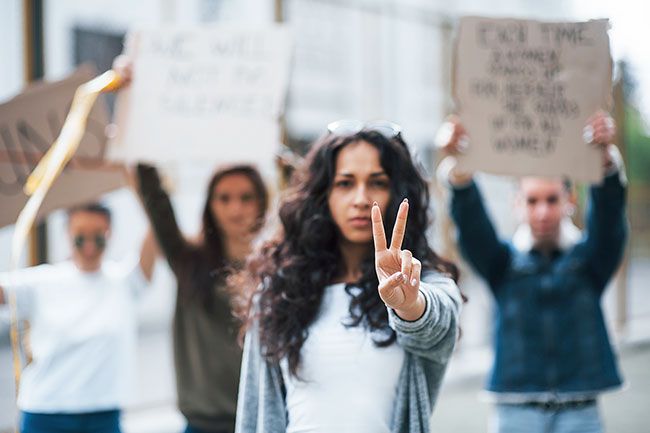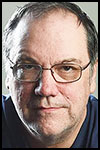Henderson: At Willamina rally, a sign for the times

I covered the protests in Portland last month. Instead, I wish I had covered the Aug. 8 protest in Willamina.
Millions of people throughout the world spent the height of the summer marching and carrying placards to affirm that Black Lives Matter. But the one I will most remember among the countless others simply provided people with suggested search terms.
The terms were just thrown out there, like bread crumbs on the path to enlightenment. They asserted no political opinions.
People were simply asked to search Vanport Flood, lash law and 14th Amendment, Oregon. Those who followed these bread crumbs would learn:
n That Oregon passed an exclusion act in 1844, authorizing the lashing of any Black caught within state boundaries.
n That the Oregon Legislature rescinded its approval of the 14th Amendment in 1868, rejecting the amendment's guarantee of citizenship for freed slaves, and that it did not rectify this wrong until 1973, at the instigation of its first Black legislator.
n That Black residents of Portland were relegated to shacks in the marshlands of Vanport, where massive flooding swept away an entire Black community of 17,500 in 1948.
What does all this have to do with the issues people are protesting about today? Follow the bread crumbs yourself.
Consult a variety of sources from a variety of perspectives. Learn the facts. Come to an educated conclusion.
That was the real message of the placard, a message we all need these days, when our opinions so often come pre-assembled for us on social media.
I wish I had been there. Unfortunately, now that I write for Portland and national news outlets, not the News-Register, I missed the Willamina rally. I only know about the placard because a friend sent me a picture of it.
From all accounts, I missed quite a show. Many people greeted the placard and the person holding it with their middle fingers, and all the other hostile and inarticulate nincompoopery we have come to expect in public discourse these days.
This is how fights get started.
One person reacts in anger and the other person responds in kind. The situation escalates.
It reminds me of a quote from Desiderius Erasmus as he expressed his misgivings about the Protestant Reformation back in the 16th century: "From argument, there would be a quick resort to the sword, and the whole world would be full of fury and madness."
Another two centuries of bloody conflict proved how right Erasmus was. I fear we risk such times if we're not living in them already.
Fortunately, I'm told tensions in Willamina never flared beyond angry words and lewd gestures.
I asked the woman holding what has now become my favorite protest placard of all time how she felt about all the animosity she endured. "Everybody got to exercise their First Amendment rights today," she said.
Statements like that give me hope in a world where hope is as often scarce as toilet paper. People who say such things provide us with a country that deserves to survive the current fire.
As I said, I missed the Willamina rally. But I did cover the protests in Portland, where many placards exclaimed: "White silence equals violence."
A noble sentiment for these times, it reminds me of something else Erasmus back in the 16th century: "He who allows oppression shares the crime."
Curiously, however, many white protesters fell silent when approached by me and other reporters.
Protest organizers often instructed them not to talk to the press. They directed reporters to designated POCs — Points of Contact — who had been thoroughly trained on what to say, how to say it, when to say it and to whom to say it.
Their comments consisted of heavily manicured talking points and policy statements that could have easily been conveyed through online postings or printed handouts.
And in fact, they often were. I was offered as many handouts as personal interviews.
I understand.
When President Donald Trump sent federal agents to Portland, the nature of the protests changed. They suddenly became less about Black Lives Matter and more about Trump. You almost come to feel sorry for the poor guy, knowing how much he hates being the center of attention.
Then there were protesters like Naked Athena — a woman striking a series of au natural ballet and yoga poses in the middle of the street, which tends to distract from the issue at hand. Between naked women and naked aggression, Black voices risked being stifled.
Protesters, especially white protesters, wanted reporters to only talk to Black representatives. The aim was to keep all the comments on brand, on point and on message.
They wisely observed this is a time for white people to get out of the way so BIPOCs — Black, Indigenous, People of Color — could join other marginalized people in speaking for themselves.
But the result was an odd serving of alphabet soup, where almost POCs for BLM had to be BIPOC. FYI, they could also be LGBTQ, but had to be primarily be BIPOC to be sufficiently PC.
I may not work for the AP, but as long as people get back to me PDQ or ASAP, I won't be PO'd. They didn't do that, however.
In my frustration, I felt at times that placards proclaiming "White Silence = Violence" should be edited to read "White Silence = All Statements to the Press Must Come from the Officially Designated Media POC."
Forgive my flippancy.
I understand this is a time when Black voices should be heard above all others. And that can be difficult in Portland, where thanks to Oregon's legacy of exclusion, the Black share of the population only runs 6%.
Portland may not be McMinnville white, but it still resembles the crowd at a Neil Diamond concert or Portland Timbers game.
This presents a dilemma. How do you, as a white person concerned about systemic racism, raise your voice in protest while simultaneously keeping it shut and deferring to the people who should really be doing the talking?
I had a knee-jerk reaction at first. Everyone should speak to me, confound it.
As a reporter, I will talk to as many people as I can and include every conceivable background. After all, the voice of truth seldom emerges without a chorus of diverse voices.
The more I thought about it, though, the more I decided the protesters were right. This is a paradoxical time — a time for Black voices to be amplified, but no time for white voices to remain silent.
So how does one strike the balance? The Willamina placard offered the answer.
Held by a white demonstrator, it offered no arguments, no rhetoric, no spin. It merely directed people to where they could find facts about the Black experience in Oregon. It quietly and intelligently helped tell the Black story without usurping the Black voice.
As more protests evolve, I hope we take this example to heart, so we can all learn together and exchange ideas rather than middle fingers.
One more quote from Erasmus comes to mind: "Give light, and the darkness will disappear of itself."








Comments